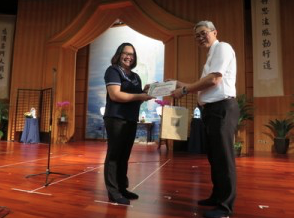Promoting environment-friendly practices in health care
Quezon City, Philippines -- The health care sector itself is considered to be among the significant sources of pollution around the world, and an unintentional contributor to the merging public health crises. According to World Health Organization (WHO), without proper waste management, health-care waste can generate hazardous material that may be infectious, toxic or radioactive; can produce potentially harmful microorganisms, which can infect hospital patients, health workers and the general public; and can have an impact to the environment.

Global Green and Healthy Hospitals Coordinator Faye Ferrer talked about eco-friendly practices in health care. (Photo by Tzu Chi Foundation)
The health care waste includes infectious and sharp discards (syringes, needles, lancets, broken glass and any other materials that can pierce the skin), chemical and radioactive wastes, and hospital wastewaters.
Most hospitals tend to incinerate the wastes that releases a number of hazardous gases and compounds, including hydrochloric acid, dioxins and furans, as well as the toxic metals lead, cadmium, and mercury. While disposal of biodegradable waste produces greenhouse gas emissions, including methane, which is 21 times more potent than carbon dioxide.
Health Care Without Harm (HCWH), an advocacy group that seeks to transform the healthcare system worldwide to be ecologically sustainable, discussed about this on the second day of the Tzu Chi International Medical Association (TIMA) Conference in the Philippines. HCWH-Asia Coordinator Faye Ferrer had the discussion on March 5.
“It is very vital and urgent to have environment-friendly hospitals because the health sectors are responsible for curing people’s sickness; but by not doing environment-friendly practices, the health sector unintentionally contributes to getting people acquire diseases,” mentions Ferrer.
This is the second time that HCWH-Asia partnered with Tzu Chi Foundation Philippines to promote their advocacy. Now, it is in a larger audience composed of TIMA members from Malaysia, Singapore, Taiwan, Indonesia, Australia, USA, and the Philippines. Local practitioners in the field of medicine from the host country were also present.
“We are thankful for this opportunity to be with Tzu Chi again. I think being with TIMA this time is way more advantageous because this meeting connects us with not only Filipinos but from other countries as well. We also had the opportunity to be with other organizations and health practitioners who are the target of our advocacy,” says Ferrer.
After discussing the hazardous medical practices that are detrimental to people’s health, Ferrer presented different kinds of alternatives that are environment-friendly such as non-incineration technologies to treat infectious waste, a strategic chemical stock keeping, as well as green buildings where hospitals can eliminate the use of hazardous chemical inside the hospitals, among others.
“It’s time for our health practitioners to deal where the source is coming from because alternatives are everywhere. The service they will be rendering here are not just for themselves or for their patients, but the environment as well. With that in mind, we can help the hospital administrators and the change makers to become green hospitals,” utters Ferrer.
Urgent concern
Aside from medical professionals, medical students were also present at the conference. Students from the University of the East Ramon Magsaysay Memorial Medical Center, Inc. (UERMMMC) considered the talk to be an eye-opener.
“The topic earlier is really informative because as physicians, we need to know different kinds of approaches and perspectives to adapt to different kinds of mentalities,” says fourth year medical student Jordan Alfafara. Who was surprised about the fact that the health care sectors also cause harm to public health.
“I was actually surprised; I did not realize that the medical field leaves such a carbon footprint, I agree to what the speaker said that we should treat the cause not just the people because we will bring them back to what cause them to be sick,” says Justin Gabor who came along with his classmates Alfafara and Dustin Battad.
For Battad, the tag line of HCWH which is “Do No Harm” promotes the sense of responsibility among medical workers. As students, and future practitioners, he says the talk has moved him to be more sensible in the practice.
“We were all wrapped up in books, focused about the future, we are more on exams that happened in a monthly basis and we tend to forget about the big picture of doing no harm. It did not occur to me that the waste that our practices produce can be detrimental to the grand scheme of health care. So it’s an eye opener for me and something to consider about in the future,” he says.
View the entire article here.
